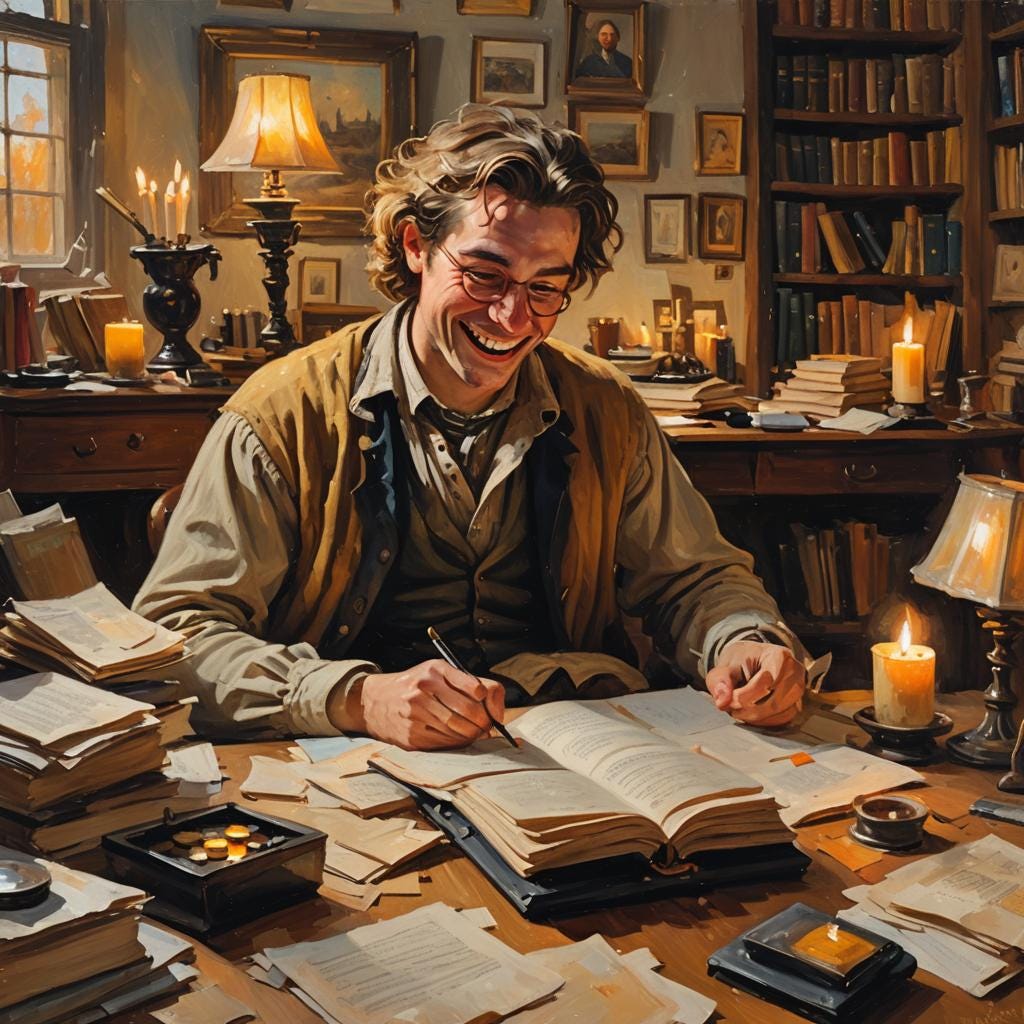Break The Writer Stereotype And Let Yourself Have Fun.
In every job that must be done, there is an element of fun.
Author Note:
I am taking the whole month of December a break. I will be stuck in cake flour and Christmas sprinkles up to my nose, so I won't be able to come here to chat with you. But don't worry; I'll be back on 1st Jan 2025. Now, back to our conversation.
Subscribe to Becoming A Writer podcast! New episodes published every 2nd and 4th Saturdays.
In every job that must be done, there is an element of fun.
- Mary Poppins
(character created by P.L. Travers)
I'll be honest with you. I think I am self-sabotaging my writing journey.
I have this image in my head that as a writer, I have to write a certain way, talk a certain way, and behave a certain way to be perceived by my readers in a certain way. I believe I have to be also serious and positive about my craft, that I have to always be sharing something of value, in a certain format and at a certain schedule.
As if the rotation and revolution of the entire solar system depends on my written words.
I have this image in my head that, as a writer, I have to struggle my way to achievement.
I am sure you have some form of this image, too - the classic writer sitting alone and lost in his thoughts and words in a dingy room surrounded by books while hunched over his notebook with a pen hanging between his fingers like a cigarette. In this image, you don't get a sense of buoyant happiness; it's more of a brooding, melancholic scene.
And then there is the after-writing image as well, where we see the writer struggling to get his words out in the world with little to no rewards or recognition.
But recently, I have been wondering if there is a more positive and encouraging way to approach my writing journey. Can't we gallop through our writing sessions?
I am sure there must be at least one way to do so. The issue is that it's just hard to adopt such a happy mindset because we have been ingrained with the serious, melancholic image of a writer throughout history and its representation and interpretation in our times.
And then there have been times, I find myself having a blast during my writing sessions.
This usually happens when I let go of the worries about the standard I need to maintain, the deadlines I need to meet, the readers I need to please, and the goals I need to reach. I simply let myself go into a flow state and enjoy the journey. Being completely absorbed in my writing and losing the sense of time and space brings a euphoric experience that feels as if created by magic.
It was only when I reflected on this experience that I realised it was not just magic but also science.
Writing is not hard. We are making it hard by thinking and behaving in a way that makes it hard for us.
Why do people have a serious, melancholic image of a writer?
The romanticisation of the writer's struggle. The popular image of the tormented writer struggling with their inner demons has been romanticised throughout history. Such an image emphasises the hardships and emotional struggles of creative individuals, therefore making us believe that writers are serious and sad 24x7.
Suicidal literary icons. Many well-known literary figures, such as Edgar Allan Poe, Sylvia Plath, and Ernest Hemingway, were known for their intense and sometimes tumultuous lives. Their biographies and works have contributed to the stereotype of the tortured artist, reinforcing the idea that writers are inherently serious, melancholic, and, in some cases, suicidal.
Depiction in literature and movies. Literature and movies often portray writers as introspective, brooding, and isolated individuals. Characters like the reclusive writer living in a secluded cabin or the struggling poet facing inner turmoil have become archetypes that shape public perception, including us writers who unconsciously buy into it.
Creative struggle. The creative process itself can be challenging and demanding. We often grapple with self-doubt, writer's block, and the pressure to produce meaningful work. Also, the intense focus and dedication required for writing may contribute to an outward appearance of seriousness. (I am sure if someone saw me right now working on this essay, they'd be intimidated. My Capricorn, INFJ, and Writer combo gives me a don't-mess-with-me appearance. Ask my mum.)
Cultural expectations. Being an artist of any kind gives us the image of being in a serious intellectual pursuit. That image then bleeds into the image of us as humans, being serious and contemplative.
The stereotypes. We all know them - the tortured artist, the reclusive writer, the starving artist, the mad genius, the drinker/smoker/snorter, the in-his-head intellectual, the has-it-all, and the perfectionist. Such images make the general public see us as mysterious and ominous and make us writers alarmed.
How can we get rid of this image?
Simply by making the experience of being a writer more human.
Let yourself enjoy life. A couple of nights ago, I was reading a Pedro Pascal fan-fiction, because why not? At one point, I wondered how I could be reading something fun as fan fiction. I am a "serious" writer, I heard the voice say. "What does that even mean?" I asked back. For your information, fan fiction is serious writing, even if it's entirely for entertainment purposes. And some of the fan fiction I have read my god, they are so well imagined and written. I wonder why there is such a stigma around reading and writing fan fiction. Let yourself enjoy your life, writer. Just because you are a writer doesn't mean you can't have a fun, silly side.
Indulge in interests, hobbies, and passions beyond writing. Again, just because you are a writer doesn't mean you can't do anything else or be something else. Enjoying such activities is good for your well-being—it'll shape you as an enriching human and, therefore, as an enriching writer.
Engage with the people around you and your readers. In-person or on social media, share (as much as you feel comfortable with) that there's more to you than your writing. You can share your interests, hobbies, and passions. You can share insights, behind-the-scenes moments, or even jokes related to your writing process. Doing so will help you and others realise that being a writer doesn't mean I have to look depressed all the time.
Bring yourself back to earth. As a writer, you can't help but get too high in your head. You will either high with negative self-talk like "I am not doing enough," or you'll indulge in ego-centric self-talk like "I know and understand more than others." Neither of those conversations is helpful for our writer soul. Stay humble. Be proud of how intellectually, mentally, emotionally or spiritually you are growing, but don't throw that attitude on others. Be proud of how far you have come on your writing journey, and know you are doing an excellent job given the circumstances. It's usually the negative or ego-centric self-talk that gives space for the writer stereotypes to grow.
Change your mindset in support of your writing. A baby doesn't just pop out; both it and the mother have to struggle for their lives in pain to take a chance at a new life. The same applies to being a writer. Yes, there will be moments and phases where we will struggle in our creative practice, and it is necessary for our growth. Believe and work towards a positive image of what it means to be a writer. Imagine how your life and work would be from this angle. Look for examples that showcase that being and thriving as a writer is not as painful as we are told. Trick your brain into thinking that being a writer is fun.
How can we make our writing process a fun activity?
Have a child-like approach under adult supervision.
When you are engaged in the activity of writing, you want to let yourself go free. Don't worry about the shoulds, coulds and woulds, the ifs and buts. Just let yourself write. Let yourself have fun just like a child at play.
Also, be the adult keeping an eye on the child. Guide yourself away from common writing falls and dangers and towards where you feel like your writing is going. Give yourself the freedom to try out different avenues in your writing but when you notice it's going too astray, bringing it back to familiar grounds.
And when you finish a session or project, celebrate it like how you would celebrate the child when it shows you their finished drawing.
It's that simple.
My book for writers, Soul Writer vs. Social Writer, is out now!






